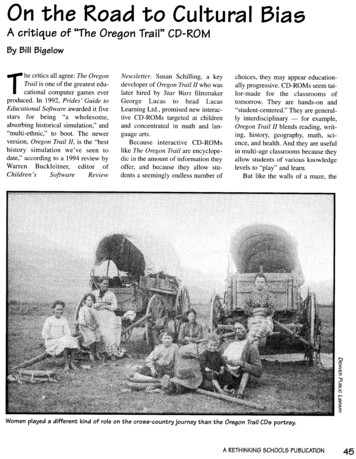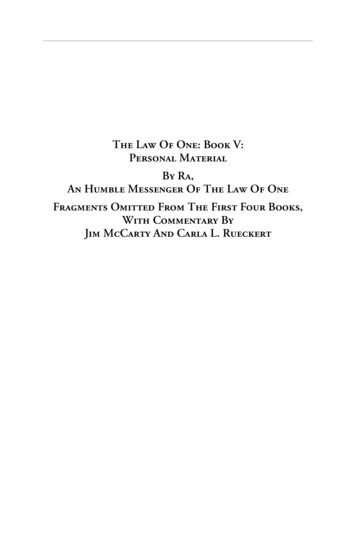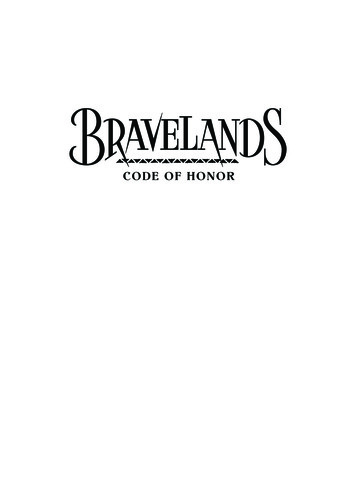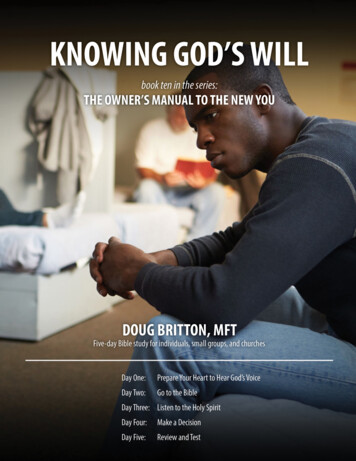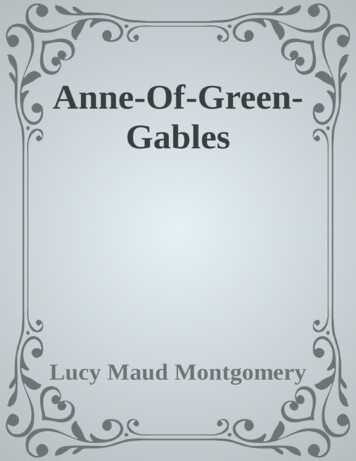
Transcription
This Book Is Brought To You BySnewd.comAB LMMGG
CM .RILSM .RLlived just where the Avonlea main road dipped downinto a little hollow, fringed with alders and ladies’ eardrops and traversed bya brook that had its source away back in the woods of the old Cuthbertplace; it was reputed to be an intricate, headlong brook in its earlier coursethrough those woods, with dark secrets of pool and cascade; but by the timeit reached Lynde’s Hollow it was a quiet, well-conducted little stream, for noteven a brook could run past Mrs. Rachel Lynde’s door without due regardfor decency and decorum; it probably was conscious that Mrs. Rachel wassitting at her window, keeping a sharp eye on everything that passed, frombrooks and children up, and that if she noticed anything odd or out of placeshe would never rest until she had ferreted out the whys and whereforesthereof.ere are plenty of people in Avonlea and out of it, who can attend closelyto their neighbor’s business by dint of neglecting their own; but Mrs. RachelLynde was one of those capable creatures who can manage their ownconcerns and those of other folks into the bargain. She was a notablehousewife; her work was always done and well done; she ‘ran’ the SewingCircle, helped run the Sunday-school, and was the strongest prop of theChurch Aid Society and Foreign Missions Auxiliary. Yet with all this Mrs.Rachel found abundant time to sit for hours at her kitchen window, knitting‘cotton warp’ quilts—she had knitted sixteen of them, as Avonleahousekeepers were wont to tell in awed voices—and keeping a sharp eye onthe main road that crossed the hollow and wound up the steep red hillbeyond. Since Avonlea occupied a little triangular peninsula jutting out intothe Gulf of St. Lawrence with water on two sides of it, anybody who wentout of it or into it had to pass over that hill road and so run the unseengauntlet of Mrs. Rachel’s all-seeing eye.She was sitting there one a ernoon in early June. e sun was coming in atthe window warm and bright; the orchard on the slope below the house wasin a bridal ush of pinkywhite bloom, hummed over by a myriad of bees.
omas Lynde— a meek little man whom Avonlea people called ‘RachelLynde’s husband’—was sowing his late turnip seed on the hill eld beyondthe barn; and Matthew Cuthbert ought to have been sowing his on the bigred brook eld away over by Green Gables. Mrs. Rachel knew that he oughtbecause she had heard him tell Peter Morrison the evening before inWilliam J. Blair’s store over at Carmody that he meant to sow his turnip seedthe next a ernoon. Peter had asked him, of course, for Matthew Cuthberthad never been known to volunteer information about anything in his wholelife.And yet here was Matthew Cuthbert, at half-past three on the a ernoon ofa busy day, placidly driving over the hollow and up the hill; moreover, hewore a white collar and his best suit of clothes, which was plain proof that hewas going out of Avonlea; and he had the buggy and the sorrel mare, whichbetokened that he was going a considerable distance. Now, where wasMatthew Cuthbert going and why was he going there?Had it been any other man in Avonlea, Mrs. Rachel, de ly putting this andthat together, might have given a pretty good guess as to both questions. ButMatthew so rarely went from home that it must be something pressing andunusual which was taking him; he was the shyest man alive and hated tohave to go among strangers or to any place where he might have to talk.Matthew, dressed up with a white collar and driving in a buggy, wassomething that didn’t happen o en. Mrs. Rachel, ponder as she might, couldmake nothing of it and her a ernoon’s enjoyment was spoiled.‘I’ll just step over to Green Gables a er tea and nd out from Marilla wherehe’s gone and why,’ the worthy woman nally concluded. ‘He doesn’tgenerally go to town this time of year and he NEVER visits; if he’d run out ofturnip seed he wouldn’t dress up and take the buggy to go for more; hewasn’t driving fast enough to be going for a doctor. Yet something must havehappened since last night to start him o . I’m clean puzzled, that’s what, andI won’t know a minute’s peace of mind or conscience until I know what hastaken Matthew Cuthbert out of Avonlea today.’Accordingly a er tea Mrs. Rachel set out; she had not far to go; the big,rambling, orchard-embowered house where the Cuthberts lived was a scantquarter of a mile up the road from Lynde’s Hollow. To be sure, the long lanemade it a good deal further. Matthew Cuthbert’s father, as shy and silent ashis son a er him, had got as far away as he possibly could from his fellowmen without actually retreating into the woods when he founded his
homestead. Green Gables was built at the furthest edge of his cleared landand there it was to this day, barely visible from the main road along whichall the other Avonlea houses were so sociably situated. Mrs. Rachel Lyndedid not call living in such a place LIVING at all.‘It’s just STAYING, that’s what,’ she said as she stepped along the deeprutted, grassy lane bordered with wild rose bushes. ‘It’s no wonder Matthewand Marilla are both a little odd, living away back here by themselves. Treesaren’t much company, though dear knows if they were there’d be enough ofthem. I’d ruther look at people. To be sure, they seem contented enough; butthen, I suppose, they’re used to it. A body can get used to anything, even tobeing hanged, as the Irishman said.’With this Mrs. Rachel stepped out of the lane into the backyard of GreenGables. Very green and neat and precise was that yard, set about on one sidewith great patriarchal willows and the other with prim Lombardies. Not astray stick nor stone was to be seen, for Mrs. Rachel would have seen it ifthere had been. Privately she was of the opinion that Marilla Cuthbert sweptthat yard over as o en as she swept her house. One could have eaten a mealo the ground without overbrimming the proverbial peck of dirt.Mrs. Rachel rapped smartly at the kitchen door and stepped in whenbidden to do so. e kitchen at Green Gables was a cheerful apartment—orwould have been cheerful if it had not been so painfully clean as to give itsomething of the appearance of an unused parlor. Its windows looked eastand west; through the west one, looking out on the back yard, came a oodof mellow June sunlight; but the east one, whence you got a glimpse of thebloom white cherry-trees in the le orchard and nodding, slender birchesdown in the hollow by the brook, was greened over by a tangle of vines.Here sat Marilla Cuthbert, when she sat at all, always slightly distrustful ofsunshine, which seemed to her too dancing and irresponsible a thing for aworld which was meant to be taken seriously; and here she sat now, knitting,and the table behind her was laid for supper.Mrs. Rachel, before she had fairly closed the door, had taken a mental noteof everything that was on that table. ere were three plates laid, so thatMarilla must be expecting some one home with Matthew to tea; but thedishes were everyday dishes and there was only crab-apple preserves andone kind of cake, so that the expected company could not be any particularcompany. Yet what of Matthew’s white collar and the sorrel mare? Mrs.Rachel was getting fairly dizzy with this unusual mystery about quiet,
unmysterious Green Gables.‘Good evening, Rachel,’ Marilla said briskly. ‘ is is a real ne evening, isn’tit’ Won’t you sit down? How are all your folks?’Something that for lack of any other name might be called friendshipexisted and always had existed between Marilla Cuthbert and Mrs. Rachel,in spite of—or perhaps because of—their dissimilarity.Marilla was a tall, thin woman, with angles and without curves; her darkhair showed some gray streaks and was always twisted up in a hard littleknot behind with two wire hairpins stuck aggressively through it. She lookedlike a woman of narrow experience and rigid conscience, which she was; butthere was a saving something about her mouth which, if it had been ever soslightly developed, might have been considered indicative of a sense ofhumor.‘We’re all pretty well,’ said Mrs. Rachel. ‘I was kind of afraid YOU weren’t,though, when I saw Matthew starting o today. I thought maybe he wasgoing to the doctor’s.’Marilla’s lips twitched understandingly. She had expected Mrs. Rachel up;she had known that the sight of Matthew jaunting o so unaccountablywould be too much for her neighbor’s curiosity.‘Oh, no, I’m quite well although I had a bad headache yesterday,’ she said.‘Matthew went to Bright River. We’re getting a little boy from an orphanasylum in Nova Scotia and he’s coming on the train tonight.’If Marilla had said that Matthew had gone to Bright River to meet akangaroo from Australia Mrs. Rachel could not have been more astonished.She was actually stricken dumb for ve seconds. It was unsupposable thatMarilla was making fun of her, but Mrs. Rachel was almost forced tosuppose it.‘Are you in earnest, Marilla?’ she demanded when voice returned to her.‘Yes, of course,’ said Marilla, as if getting boys from orphan asylums inNova Scotia were part of the usual spring work on any well-regulatedAvonlea farm instead of being an unheard of innovation.Mrs. Rachel felt that she had received a severe mental jolt. She thought inexclamation points. A boy! Marilla and Matthew Cuthbert of all peopleadopting a boy! From an orphan asylum! Well, the world was certainlyturning upside down! She would be surprised at nothing a er this! Nothing!‘What on earth put such a notion into your head?’ she demandeddisapprovingly.
is had been done without here advice being asked, and must perforce bedisapproved.‘Well, we’ve been thinking about it for some time—all winter in fact,’returned Marilla. ‘Mrs. Alexander Spencer was up here one day beforeChristmas and she said she was going to get a little girl from the asylum overin Hopeton in the spring. Her cousin lives there and Mrs. Spencer hasvisited here and knows all about it. So Matthew and I have talked it over oand on ever since. We thought we’d get a boy. Matthew is getting up in years,you know—he’s sixty— and he isn’t so spry as he once was. His hearttroubles him a good deal. And you know how desperate hard it’s got to be toget hired help. ere’s never anybody to be had but those stupid, half-grownlittle French boys; and as soon as you do get one broke into your ways andtaught something he’s up and o to the lobster canneries or the States. Atrst Matthew suggested getting a Home boy. But I said ‘no’ at to that. ‘ eymay be all right—I’m not saying they’re not—but no London street Arabsfor me,’ I said. ‘Give me a native born at least. ere’ll be a risk, no matterwho we get. But I’ll feel easier in my mind and sleep sounder at nights if weget a born Canadian.’ So in the end we decided to ask Mrs. Spencer to pickus out one when she went over to get her little girl. We heard last week shewas going, so we sent her word by Richard Spencer’s folks at Carmody tobring us a smart, likely boy of about ten or eleven. We decided that would bethe best age—old enough to be of some use in doing chores right o andyoung enough to be trained up proper. We mean to give him a good homeand schooling. We had a telegram from Mrs. Alexander Spencer today—themail-man brought it from the station— saying they were coming on the vethirty train tonight. So Matthew went to Bright River to meet him. Mrs.Spencer will drop him o there. Of course she goes on to White Sandsstation herself.’Mrs. Rachel prided herself on always speaking her mind; she proceeded tospeak it now, having adjusted her mental attitude to this amazing piece ofnews.‘Well, Marilla, I’ll just tell you plain that I think you’re doing a mightyfoolish thing—a risky thing, that’s what. You don’t know what you’re getting.You’re bringing a strange child into your house and home and you don’tknow a single thing about him nor what his disposition is like nor what sortof parents he had nor how he’s likely to turn out. Why, it was only last week Iread in the paper how a man and his wife up west of the Island took a boy
out of an orphan asylum and he set re to the house at night—set it ONPURPOSE, Marilla—and nearly burnt them to a crisp in their beds. And Iknow another case where an adopted boy used to suck the eggs—theycouldn’t break him of it. If you had asked my advice in the matter—whichyou didn’t do, Marilla—I’d have said for mercy’s sake not to think of such athing, that’s what.’is Job’s comforting seemed neither to o end nor to alarm Marilla. Sheknitted steadily on.‘I don’t deny there’s something in what you say, Rachel. I’ve had somequalms myself. But Matthew was terrible set on it. I could see that, so I gavein. It’s so seldom Matthew sets his mind on anything that when he does Ialways feel it’s my duty to give in. And as for the risk, there’s risks in prettynear everything a body does in this world. ere’s risks in people’s havingchildren of their own if it comes to that—they don’t always turn out well.And then Nova Scotia is right close to the Island. It isn’t as if we were gettinghim from England or the States. He can’t be much di erent from ourselves.’‘Well, I hope it will turn out all right,’ said Mrs. Rachel in a tone thatplainly indicated her painful doubts. ‘Only don’t say I didn’t warn you if heburns Green Gables down or puts strychnine in the well—I heard of a caseover in New Brunswick where an orphan asylum child did that and thewhole family died in fearful agonies. Only, it was a girl in that instance.’‘Well, we’re not getting a girl,’ said Marilla, as if poisoning wells were apurely feminine accomplishment and not to be dreaded in the case of a boy.‘I’d never dream of taking a girl to bring up. I wonder at Mrs. AlexanderSpencer for doing it. But there, SHE wouldn’t shrink from adopting a wholeorphan asylum if she took it into her head.’Mrs. Rachel would have liked to stay until Matthew came home with hisimported orphan. But re ecting that it would be a good two hours at leastbefore his arrival she concluded to go up the road to Robert Bell’s and tellthe news. It would certainly make a sensation second to none, and Mrs.Rachel dearly loved to make a sensation. So she took herself away, somewhatto Marilla’s relief, for the latter felt her doubts and fears reviving under thein uence of Mrs. Rachel’s pessimism.‘Well, of all things that ever were or will be!’ ejaculated Mrs. Rachel whenshe was safely out in the lane. ‘It does really seem as if I must be dreaming.Well, I’m sorry for that poor young one and no mistake. Matthew andMarilla don’t know anything about children and they’ll expect him to be
wiser and steadier that his own grandfather, if so be’s he ever had agrandfather, which is doubtful. It seems uncanny to think of a child at GreenGables somehow; there’s never been one there, for Matthew and Marillawere grown up when the new house was built—if they ever WERE children,which is hard to believe when one looks at them. I wouldn’t be in thatorphan’s shoes for anything. My, but I pity him, that’s what.’So said Mrs. Rachel to the wild rose bushes out of the fulness of her heart;but if she could have seen the child who was waiting patiently at the BrightRiver station at that very moment her pity would have been still deeper andmore profound.
CMIICMCthe sorrel mare jogged comfortably over theeight miles to Bright River. It was a pretty road, running along between snugfarmsteads, with now and again a bit of balsamy r wood to drive throughor a hollow where wild plums hung out their lmy bloom. e air was sweetwith the breath of many apple orchards and the meadows sloped away in thedistance to horizon mists of pearl and purple; while‘ e little birds sang as if it weree one day of summer in all the year.’Matthew enjoyed the drive a er his own fashion, except during themoments when he met women and had to nod to them— for in PrinceEdward island you are supposed to nod to all and sundry you meet on theroad whether you know them or not.Matthew dreaded all women except Marilla and Mrs. Rachel; he had anuncomfortable feeling that the mysterious creatures were secretly laughing athim. He may have been quite right in thinking so, for he was an odd-lookingpersonage, with an ungainly gure and long iron-gray hair that touched hisstooping shoulders, and a full, so brown beard which he had worn eversince he was twenty. In fact, he had looked at twenty very much as he lookedat sixty, lacking a little of the grayness.When he reached Bright River there was no sign of any train; he thoughthe was too early, so he tied his horse in the yard of the small Bright Riverhotel and went over to the station house. e long platform was almostdeserted; the only living creature in sight being a girl who was sitting on apile of shingles at the extreme end. Matthew, barely noting that it WAS a girl,sidled past her as quickly as possible without looking at her. Had he lookedhe could hardly have failed to notice the tense rigidity and expectation of herattitude and expression. She was sitting there waiting for something orsomebody and, since sitting and waiting was the only thing to do just then,she sat and waited with all her might and main.
Matthew encountered the stationmaster locking up the ticket o cepreparatory to going home for supper, and asked him if the ve-thirty trainwould soon be along.‘ e ve-thirty train has been in and gone half an hour ago,’ answered thatbrisk o cial. ‘But there was a passenger dropped o for you—a little girl.She’s sitting out there on the shingles. I asked her to go into the ladies’waiting room, but she informed me gravely that she preferred to stayoutside. ‘ ere was more scope for imagination,’ she said. She’s a case, Ishould say.’‘I’m not expecting a girl,’ said Matthew blankly. ‘It’s a boy I’ve come for. Heshould be here. Mrs. Alexander Spencer was to bring him over from NovaScotia for me.’e stationmaster whistled.‘Guess there’s some mistake,’ he said. ‘Mrs. Spencer came o the train withthat girl and gave her into my charge. Said you and your sister were adoptingher from an orphan asylum and that you would be along for her presently.at’s all I know about it—and I haven’t got any more orphans concealedhereabouts.’‘I don’t understand,’ said Matthew helplessly, wishing that Marilla was athand to cope with the situation.‘Well, you’d better question the girl,’ said the stationmaster carelessly. ‘Idare say she’ll be able to explain— she’s got a tongue of her own, that’scertain. Maybe they were out of boys of the brand you wanted.’He walked jauntily away, being hungry, and the unfortunate Matthew wasle to do that which was harder for him than bearding a lion in its den—walk up to a girl—a strange girl—an orphan girl—and demand of her whyshe wasn’t a boy. Matthew groaned in spirit as he turned about and shu edgently down the platform towards her.She had been watching him ever since he had passed her and she had hereyes on him now. Matthew was not looking at her and would not have seenwhat she was really like if he had been, but an ordinary observer would haveseen this: A child of about eleven, garbed in a very short, very tight, veryugly dress of yellowish-gray wincey. She wore a faded brown sailor hat andbeneath the hat, extending down her back, were two braids of very thick,decidedly red hair. Her face was small, white and thin, also much freckled;her mouth was large and so were her eyes, which looked green in somelights and moods and gray in others.
So far, the ordinary observer; an extraordinary observer might have seenthat the chin was very pointed and pronounced; that the big eyes were full ofspirit and vivacity; that the mouth was sweet-lipped and expressive; that theforehead was broad and full; in short, our discerning extraordinary observermight have concluded that no commonplace soul inhabited the body of thisstray womanchild of whom shy Matthew Cuthbert was so ludicrously afraid.Matthew, however, was spared the ordeal of speaking rst, for as soon asshe concluded that he was coming to her she stood up, grasping with onethin brown hand the handle of a shabby, old-fashioned carpet-bag; the othershe held out to him.‘I suppose you are Mr. Matthew Cuthbert of Green Gables?’ she said in apeculiarly clear, sweet voice. ‘I’m very glad to see you. I was beginning to beafraid you weren’t coming for me and I was imagining all the things thatmight have happened to prevent you. I had made up my mind that if youdidn’t come for me to-night I’d go down the track to that big wild cherrytree at the bend, and climb up into it to stay all night. I wouldn’t be a bitafraid, and it would be lovely to sleep in a wild cherry-tree all white withbloom in the moonshine, don’t you think? You could imagine you weredwelling in marble halls, couldn’t you? And I was quite sure you would comefor me in the morning, if you didn’t to-night.’Matthew had taken the scrawny little hand awkwardly in his; then andthere he decided what to do. He could not tell this child with the glowingeyes that there had been a mistake; he would take her home and let Marillado that. She couldn’t be le at Bright River anyhow, no matter what mistakehad been made, so all questions and explanations might as well be deferreduntil he was safely back at Green Gables.‘I’m sorry I was late,’ he said shyly. ‘Come along. e horse is over in theyard. Give me your bag.’‘Oh, I can carry it,’ the child responded cheerfully. ‘It isn’t heavy. I’ve got allmy worldly goods in it, but it isn’t heavy. And if it isn’t carried in just acertain way the handle pulls out—so I’d better keep it because I know theexact knack of it. It’s an extremely old carpet-bag. Oh, I’m very glad you’vecome, even if it would have been nice to sleep in a wild cherry-tree. We’vegot to drive a long piece, haven’t we? Mrs. Spencer said it was eight miles.I’m glad because I love driving. Oh, it seems so wonderful that I’m going tolive with you and belong to you. I’ve never belonged to anybody—not really.But the asylum was the worst. I’ve only been in it four months, but that was
enough. I don’t suppose you ever were an orphan in an asylum, so you can’tpossibly understand what it is like. It’s worse than anything you couldimagine. Mrs. Spencer said it was wicked of me to talk like that, but I didn’tmean to be wicked. It’s so easy to be wicked without knowing it, isn’t it? eywere good, you know—the asylum people. But there is so little scope for theimagination in an asylum—only just in the other orphans. It was prettyinteresting to imagine things about them—to imagine that perhaps the girlwho sat next to you was really the daughter of a belted earl, who had beenstolen away from her parents in her infancy by a cruel nurse who died beforeshe could confess. I used to lie awake at nights and imagine things like that,because I didn’t have time in the day. I guess that’s why I’m so thin—I AMdreadful thin, ain’t I? ere isn’t a pick on my bones. I do love to imagine I’mnice and plump, with dimples in my elbows.’With this Matthew’s companion stopped talking, partly because she wasout of breath and partly because they had reached the buggy. Not anotherword did she say until they had le the village and were driving down asteep little hill, the road part of which had been cut so deeply into the sosoil, that the banks, fringed with blooming wild cherry-trees and slim whitebirches, were several feet above their heads.e child put out her hand and broke o a branch of wild plum thatbrushed against the side of the buggy.‘Isn’t that beautiful? What did that tree, leaning out from the bank, allwhite and lacy, make you think of?’ she asked.‘Well now, I dunno,’ said Matthew.‘Why, a bride, of course—a bride all in white with a lovely misty veil. I’venever seen one, but I can imagine what she would look like. I don’t everexpect to be a bride myself. I’m so homely nobody will ever want to marryme— unless it might be a foreign missionary. I suppose a foreign missionarymightn’t be very particular. But I do hope that some day I shall have a whitedress. at is my highest ideal of earthly bliss. I just love pretty clothes. AndI’ve never had a pretty dress in my life that I can remember—but of courseit’s all the more to look forward to, isn’t it? And then I can imagine that I’mdressed gorgeously. is morning when I le the asylum I felt so ashamedbecause I had to wear this horrid old wincey dress. All the orphans had towear them, you know. A merchant in Hopeton last winter donated threehundred yards of wincey to the asylum. Some people said it was because hecouldn’t sell it, but I’d rather believe that it was out of the kindness of his
heart, wouldn’t you? When we got on the train I felt as if everybody must belooking at me and pitying me. But I just went to work and imagined that Ihad on the most beautiful pale blue silk dress—because when you AREimagining you might as well imagine something worth while—and a big hatall owers and nodding plumes, and a gold watch, and kid gloves and boots.I felt cheered up right away and I enjoyed my trip to the Island with all mymight. I wasn’t a bit sick coming over in the boat. Neither was Mrs. Spenceralthough she generally is. She said she hadn’t time to get sick, watching tosee that I didn’t fall overboard. She said she never saw the beat of me forprowling about. But if it kept her from being seasick it’s a mercy I did prowl,isn’t it? And I wanted to see everything that was to be seen on that boat,because I didn’t know whether I’d ever have another opportunity. Oh, thereare a lot more cherry-trees all in bloom! is Island is the bloomiest place. Ijust love it already, and I’m so glad I’m going to live here. I’ve always heardthat Prince Edward Island was the prettiest place in the world, and I used toimagine I was living here, but I never really expected I would. It’s delightfulwhen your imaginations come true, isn’t it? But those red roads are so funny.When we got into the train at Charlottetown and the red roads began toash past I asked Mrs. Spencer what made them red and she said she didn’tknow and for pity’s sake not to ask her any more questions. She said I musthave asked her a thousand already. I suppose I had, too, but how you goingto nd out about things if you don’t ask questions? And what DOES makethe roads red?’‘Well now, I dunno,’ said Matthew.‘Well, that is one of the things to nd out sometime. Isn’t it splendid tothink of all the things there are to nd out about? It just makes me feel gladto be alive— it’s such an interesting world. It wouldn’t be half so interesting ifwe know all about everything, would it? ere’d be no scope for imaginationthen, would there? But am I talking too much? People are always telling me Ido. Would you rather I didn’t talk? If you say so I’ll stop. I can STOP when Imake up my mind to it, although it’s di cult.’Matthew, much to his own surprise, was enjoying himself. Like most quietfolks he liked talkative people when they were willing to do the talkingthemselves and did not expect him to keep up his end of it. But he had neverexpected to enjoy the society of a little girl. Women were bad enough in allconscience, but little girls were worse. He detested the way they had ofsidling past him timidly, with sidewise glances, as if they expected him to
gobble them up at a mouthful if they ventured to say a word. at was theAvonlea type of well-bred little girl. But this freckled witch was verydi erent, and although he found it rather di cult for his slower intelligenceto keep up with her brisk mental processes he thought that he ‘kind of likedher chatter.’ So he said as shyly as usual:‘Oh, you can talk as much as you like. I don’t mind.’‘Oh, I’m so glad. I know you and I are going to get along together ne. It’ssuch a relief to talk when one wants to and not be told that children shouldbe seen and not heard. I’ve had that said to me a million times if I have once.And people laugh at me because I use big words. But if you have big ideasyou have to use big words to express them, haven’t you?’‘Well now, that seems reasonable,’ said Matthew.‘Mrs. Spencer said that my tongue must be hung in the middle. But it isn’t—it’s rmly fastened at one end. Mrs. Spencer said your place was namedGreen Gables. I asked her all about it. And she said there were trees allaround it. I was gladder than ever. I just love trees. And there weren’t any atall about the asylum, only a few poor weeny-teeny things out in front withlittle whitewashed cagey things about them. ey just looked like orphansthemselves, those trees did. It used to make me want to cry to look at them. Iused to say to them, ‘Oh, you POOR little things! If you were out in a greatbig woods with other trees all around you and little mosses and Junebellsgrowing over your roots and a brook not far away and birds singing in youbranches, you could grow, couldn’t you? But you can’t where you are. I knowjust exactly how you feel, little trees.’ I felt sorry to leave them behind thismorning. You do get so attached to things like that, don’t you? Is there abrook anywhere near Green Gables? I forgot to ask Mrs. Spencer that.’‘Well now, yes, there’s one right below the house.’‘Fancy. It’s always been one of my dreams to live near a brook. I neverexpected I would, though. Dreams don’t o en come true, do they? Wouldn’tit be nice if they did? But just now I feel pretty nearly perfectly happy. I can’tfeel exactly perfectly happy because—well, what color would you call this?’She twitched one of her long glossy braids over her thin shoulder and heldit up before Matthew’s eyes. Matthew was not used to deciding on the tintsof ladies’ tresses, but in this case there couldn’t be much doubt.‘It’s red, ain’t it?’ he said.e girl let the braid drop back with a sigh that seemed to come from hervery toes and to exhale forth all the sorrows of the ages.
‘Yes, it’s red,’ she said resignedly. ‘Now you see why I can’t be perfectlyhappy. Nobody could who has red hair. I don’t mind the o
This Book Is Brought To You By - SNEWD . 6-?;




